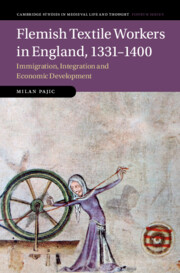Book contents
- Flemish Textile Workers in England, 1331–1400
- Cambridge Studies in Medieval Life and Thought Fourth Series
- Flemish Textile Workers in England, 1331–1400
- Copyright page
- Contents
- Figures
- Maps
- Tables
- Acknowledgements
- Note on Currency, Weights and Measures
- Abbreviations
- Introduction
- Chapter 1 Anglo-Flemish Economic Relations, Complex Urban Revolts and the Politics of Collective Exile in Flanders
- Chapter 2 Flemish and Brabantine Immigrants as Permanent Residents in England 1351–1400
- Chapter 3 Social Relationships and Business Networks of the Flemish Community in England
- Chapter 4 Economic Activities of the Immigrants from the Low Countries: Wool and Woollen Cloth Production and Trade
- Chapter 5 Women from the Low Countries in England and Their Economic Activities
- Chapter 6 Anti-Fleming Sentiment and the Peasants’ Revolt of 1381
- Conclusion
- Book part
- Select Bibliography
- Index
Chapter 6 - Anti-Fleming Sentiment and the Peasants’ Revolt of 1381
Published online by Cambridge University Press: 16 November 2023
- Flemish Textile Workers in England, 1331–1400
- Cambridge Studies in Medieval Life and Thought Fourth Series
- Flemish Textile Workers in England, 1331–1400
- Copyright page
- Contents
- Figures
- Maps
- Tables
- Acknowledgements
- Note on Currency, Weights and Measures
- Abbreviations
- Introduction
- Chapter 1 Anglo-Flemish Economic Relations, Complex Urban Revolts and the Politics of Collective Exile in Flanders
- Chapter 2 Flemish and Brabantine Immigrants as Permanent Residents in England 1351–1400
- Chapter 3 Social Relationships and Business Networks of the Flemish Community in England
- Chapter 4 Economic Activities of the Immigrants from the Low Countries: Wool and Woollen Cloth Production and Trade
- Chapter 5 Women from the Low Countries in England and Their Economic Activities
- Chapter 6 Anti-Fleming Sentiment and the Peasants’ Revolt of 1381
- Conclusion
- Book part
- Select Bibliography
- Index
Summary
The aim of this chapter will be threefold: to revisit the economic arguments advanced by Hilton and others by considering them in their full political context; to provide an account of the identity of the attackers and of the Flemings who were killed in East Anglia and London by drawing on documentary and prosopographical work; and to evaluate the effects of the massacre on the immigrant community and immigration in England after 1381. First, it will reconstruct a three-decade-long quarrel between native and alien weavers of London which culminated in the murder of Flemings during the Peasants’ Revolt.Then, attention will be turned to the available judicial records in order to develop the biographies and prosopography both of the attackers and the victims in East Anglia. Finally, the years after the revolt will be examined from the perspective of old and new immigrants, both of which groups seem to have been affected.
- Type
- Chapter
- Information
- Flemish Textile Workers in England, 1331–1400Immigration, Integration and Economic Development, pp. 240 - 265Publisher: Cambridge University PressPrint publication year: 2023

